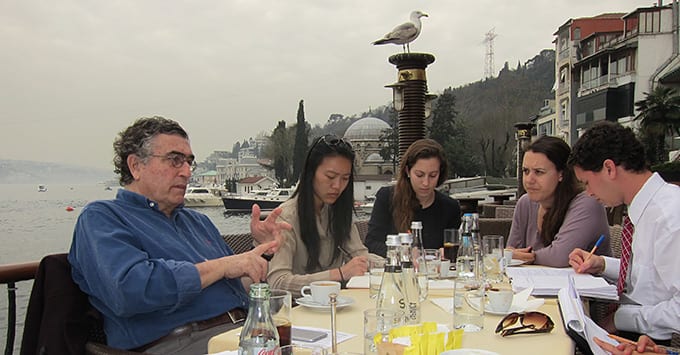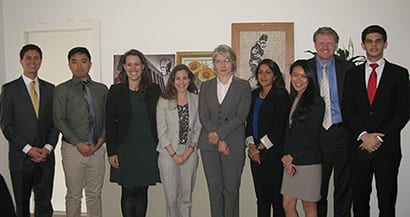
By Wendy Witherspoon
The renowned Turkish journalist Hasan Cemal sat on the patio of Istanbul’s Bebek Hotel last month, the waters of the Bosphorus Strait lapping behind him. Around Cemal crowded six Berkeley Law students who had been preparing for weeks to interview him — and more than two dozen other Turkish politicians, jurists and human rights advocates — for Lecturer in Residence Jamie O’Connell’s course “The Law and Politics of Turkey: Contemporary Issues.”
In the first half of the semester, the students and O’Connell, a senior fellow at the Miller Institute for Global Challenges and the Law, had intensively studied Turkey’s modern political and legal development. “The readings were just the jumping off point for the real learning, which happened in our discussions,” O’Connell said. “The students assimilated extraordinarily complex material on history, politics and law, with a level of sophistication that is amazing even for Berkeley Law students.”
The course underscores the law school’s commitment to global engagement.
“As Dean Choudhry has emphasized, in a globalized era, our graduates increasingly face transnational issues in their work — whether they work for law firms, companies, government, or nonprofits,” O’Connell said. “Training in international and comparative law also sharpens core skills that all lawyers need, such as the ability to comprehend widely varying points of view, regardless of how much they work across borders.”
Turkey presents a significant case study for law students interested in international issues, O’Connell explained. Often seen as a bridge between Europe and the Middle East, Turkey is an economically advanced democracy on the front lines of the civil war in Syria and the struggle against the brutal Islamic State there and in Iraq. It hosts over 1.5 million Syrian refugees, and its moderate Islamist government was seen as a model for democratizing Arab states after the Arab Spring. At the same time, the country faces increasing criticism at home and abroad for authoritarian tendencies and for refusing to recognize the 1915 Armenian massacres as genocide.
For Abby Ludwig ’15, who had studied comparative politics before enrolling at Berkeley Law, the course provided an opportunity for multidisciplinary study. “I came to Berkeley excited about the opportunity to learn about how law and politics interact. The course explored these issues on a both a theoretical and practical level,” she said.
The small group setting was equally compelling. “Working with this group of peers was one of the most exciting experiences I have had in law school,” Ludwig said. “Professor O’Connell purposefully chose six students whose perspectives and personalities would challenge and complement each other. We learned a huge amount from each other and formed an intense personal bond over the course of the semester.”
Sahar Maali ’15 admits that when she first saw the course announcement, she was skeptical — the intimate class setting, a chance to focus on a particular international region and the opportunity to travel — “it just seemed too ideal,” she said.
Maali had spent the previous summer working for WilmerHale on an arbitration proceeding between Iraq’s national government and the country’s Kurdish region over oil exports. When she visited O’Connell in his office to discuss whether she should apply for his seminar, she was quickly convinced. “I knew this course would be a wonderful capstone to my law school career” she said.

Contrasting perspectives
Before the trip, the students researched the backgrounds of the interviewees and drafted in depth interview questions on women’s rights, democratization, the role of the military in politics, and the treatment of ethnic minorities. One student was designated to lead each meeting.
“One of the skills the students developed was how to orchestrate discussions with senior professionals to get the information and analysis they needed,” O’Connell said. “That skill is important in many professional contexts, such as investigative interviewing for legal cases.”
As a counterpoint to Cemal’s liberal views on fraught relations between the Turkish state and the country’s large Kurdish ethnic minority, O’Connell arranged an interview with retired Lt. Gen. Altay Tokat, who discussed the military’s twenty-year-long conflict against the armed wing of the Kurdistan Workers Party (PKK). Many of Tokat’s positions contrasted with those of several students, which challenged their interview skills.
“We did not think it would be respectful — or feasible— to change the minds of people we met, but we did find it valuable to do more than just absorb passively,” Mark Donig ‘16 said. “We sometimes challenged General Tokat, and others, but always with respect and with an appreciation that the differences between us presented an opportunity for us to learn and reflect.”
Gender equality is another contentious issue in Turkey, where women’s rights activists have secured important new protections against discrimination, but fear that the growing role of religion in public life will erode those gains. The law students interviewed Meryam Göka and Zeynep Jane Kandur, strong supporters of the Islamist ruling party, as well as Emine Tarhan, a member of parliament, leader of the opposition Anatolia Party, and advocate for the strict separation of religion and state.
The direct access to different perspectives and legal cultures that this course provided is a critical component of a global legal education, in Ludwig’s view.
“Legal issues are no longer confined within national borders,” Ludwig said. “Globalization has been changing the legal profession profoundly. That dynamism will make my career more exciting, but also more challenging. This course offered an invaluable opportunity to explore that shifting landscape and further prepare myself for practice.”